Sculptures
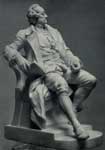
Goethe
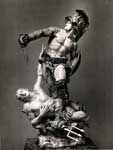
Gladiator and defeated Slave
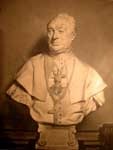
Bishop Heiller
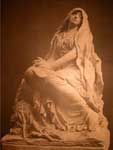
Grave monument Holly
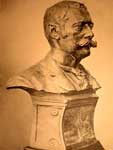
Viktor Silberer
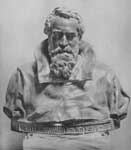
Carl Gangolf Kaiser
Viktor Oskar Tilgner (25 October 1844, Bratislava - 16 April 1896, Vienna) was an Austrian sculptor and portraitist. He is the chief representative of the neo-Baroque style in the sculpture of the Ringstrasse.
Life
Victor Tilgner was born the son of a captain in Bratislava, but even as a child moved to Vienna and has since been connected with this city. Very early in his interest and talent of the sculptor Franz Schoenthaler was detected, which was also his first teacher.
At the Academy of Fine Arts in Vienna he first began to study with Franz Bauer, but soon moved to the Tyrolean sculptor Josef Gasser, who sparked by its proximity to the holy statues in Tilgner "Baroque" interest and introduced him to the practical work. In parallel he led the medalist Joseph Daniel Böhm in the art of Ziselierens.
Viktor Tilgner realistic academicism was Makart, a leading painter influenced the Ringstrasse era, with whom he also traveled to Italy in 1874. In addition, the sculptor had also made contact with Johann Strauss and belonged to the circle of artists around Karl Graf Lanckoronski. He was also heavily influenced by French sculptor Jean-Baptiste Gustave Deloye, who had arrived at the World Exhibition in Vienna. [1]
His honored grave is located in Vienna's Central Cemetery (section 14 A, No. 28).
Works
The statue of Wolfgang Amadeus Mozart in Vienna Castle Garden is the main work of Tilgner and was also its last. It was originally developed for the space in front of the Albertina created. The moving figures, cherubs at the base, representing the power of Mozart's music suggests, stylistically been going to the Art Nouveau style. It was unveiled a few days after death Tilgner.
His other work included architectural sculptures for the royal museums, the Burgtheater, the Neue Hofburg and the Hermes Villa, and several wells (Tilgner Fountain popularly Garden, 1877), Monuments (Werndl monument in Steyr, 1894) and some grave monuments. He was also known for his portrait busts (including Pedro Calderon de la Barca, Shakespeare, Molière, Gotthold Ephraim Lessing, Goethe, Friedrich Schiller, Friedrich Hebbel, Grillparzer and Friedrich Halm for the Burgtheater) and many medals.
The bulk of the estate of Tilgner went to his hometown and is now in the Bratislava City Gallery to see. His works adorn all the important buildings of the Ringstrasse in Vienna and other places.
(Before 1873 :) Friederike Kronau, bust
1868: Vincenzo Bellini, bust, Vienna State Opera
1872: Leopold V, sculpture, Museum of Military History
1879: triton and nymph fountain group, People's Garden in Vienna
1879: Peter Paul Rubens, sculpture, Künstlerhaus Vienna
1882: Fountain Group, Amorino on dolphin, Imperial Villa
1876: Joseph von Führich, bust, Kunsthistorisches Museum, Vienna
Christian Daniel Rauch, statue, Kunsthistorisches Museum, Vienna
Peter von Cornelius, statue, Kunsthistorisches Museum, Vienna
Moritz von Schwind, statue, Kunsthistorisches Museum, Vienna
Alexander von Humboldt, statue, Natural History Museum, Vienna
Leopold von Buch, sculpture, Museum of Natural History
Isaac Newton, statue, Natural History Museum, Vienna
Carl von Linné, statue, Natural History Museum, Vienna
Archimedes, statue, Austrian Parliament
Marcus Varro Varro, statue, Austrian Parliament
Homer statue, Austrian Parliament
Phidias, statue, Austrian Parliament
Don Juan, the Burgtheater
Phaedra, the Burgtheater
Falstaff, the Burgtheater
Buffoon who's Burgtheater
William Shakespeare, the Burgtheater
Pedro Calderon de la Barca, the Burgtheater
Molière, the Burgtheater
Gotthold Ephraim Lessing, the Burgtheater
Johann Wolfgang von Goethe, the Burgtheater
Friedrich Schiller, the Burgtheater
Friedrich Hebbel, the Burgtheater
Franz Grillparzer, Burgtheater
Karl Felix Halm, Burgtheater
Helene Odilon, Vienna People's Theatre
Prokop von Rokitansky, medallion portrait, Vienna Polyclinic
Johann von Oppolzer, medallion portrait, Vienna Polyclinic
Josef Škoda, medallion portrait, Vienna Polyclinic
Josef Hyrtl, medallion portrait, Vienna Polyclinic
Ernst Wilhelm von bridge, medallion portrait, Vienna Polyclinic
Ferdinand von Hebra, medallion portrait, Vienna Polyclinic
Sigmund (friend?), Medallion portrait, Vienna Polyclinic
Franz shoe (physician), medallion portrait, Vienna Polyclinic
Carl Ferdinand von Arlt, medallion portrait, Vienna Polyclinic
Otto Braun-Falco, medallion portrait, Vienna Polyclinic
John of Dumreicher, medallion portrait, Vienna Polyclinic
Gustav Jäger, medallion portrait, Vienna Polyclinic
Turk, medallion portrait, Vienna Polyclinic
Loyalty and bravery, group of figures, the Imperial Palace
Franz Joseph I (Austria-Hungary), Bust, Imperial Palace
Elisabeth in Bavaria, Bust, Imperial Palace
Rudolf of Austria-Hungary, Bust, Imperial Palace
Johann Nepomuk Hummel, monuments, Bratislava
Ganymede (mythology), Fountain, Bratislava
1873, Charlotte Wolter, bust
Rudolf Petersen (Hamburg);
1892, Mozart monument, Albertinaplatz
Mater Dolorosa, Chapel in Mayerling
Ferdinand von Hebra, bust, arcaded courtyard of the University of Vienna
1892, Josef Werndl, Monument, Steyr
1891, cherubs, Munich
Franz Liszt, monuments, Sopron,
Makart, monuments - Design
Johann Wolfgang von Goethe, monument design
Ami Boué, bust, Gallery in the Belvedere, Vienna
Redesign of the Black Mountain Square
Portrait of Emperor Franz Joseph at the Kaiser-Franz-Joseph-obelisk, Stelvio
Awards
1868: Hofpreis and scholarship
1868: Medal Füger
1874: Karl Ludwig medal
1874: Gold medal in Munich (for bust in detail)
1880: Reichel-price (for the triton and nymph fountain group)
1882: Grand gold medal in Vienna (for the fountain on dolphin group Amorino)
1883: professor
1888: Honorary Member of the Academy of Fine Arts Vienna
1891: Grand Gold medal and honorary diploma from Munich (to the cherubs)
1897: Vienna-Wieden Tilgnerstraße
1928: Tilgnergasse in Vienna Liesing
Literature
Ludwig Hevesi: Victor Tilgner selected works, Lowy, Vienna 1897th 11 pages text and 72 pages of light pressure
Fritz Pollak. Tilgner, Victor Oscar. In: General German Biography (ADB). Volume 54, Duncker & Humblot, Leipzig 1908, pp. 703-705.
Gerhardt Kapner: ring road monuments. The Ringstrasse - of an era. 1973rd
Mary-Pötzl Malikova: The sculpture of the ring road from 1890 to 1918. 1976th
Walter Krause: The sculpture of the Ringstrasse. From late Romanticism to the turn of 1900. 1980th
Viktor Tilgner. In: Ulrich Thieme, Felix Becker, among others: general lexicon of visual arts from antiquity to the present. Volume 33, EA Seemann, Leipzig 1939, pp. 169
Post by Walter Krause, Jane Turner: The Dictionary of Art, Band 30 1996-1998, pp. 888-890.
Mary-Pötzl Malikova: The Vienna Ringstrasse. Picture of an era IX / 2 Artistic development from 1890 to 1918. 1998th
Art Books, Austria
Retrieved from "http://en.wikipedia.org/ ", Text is available under the Creative Commons Attribution-ShareAlike License
